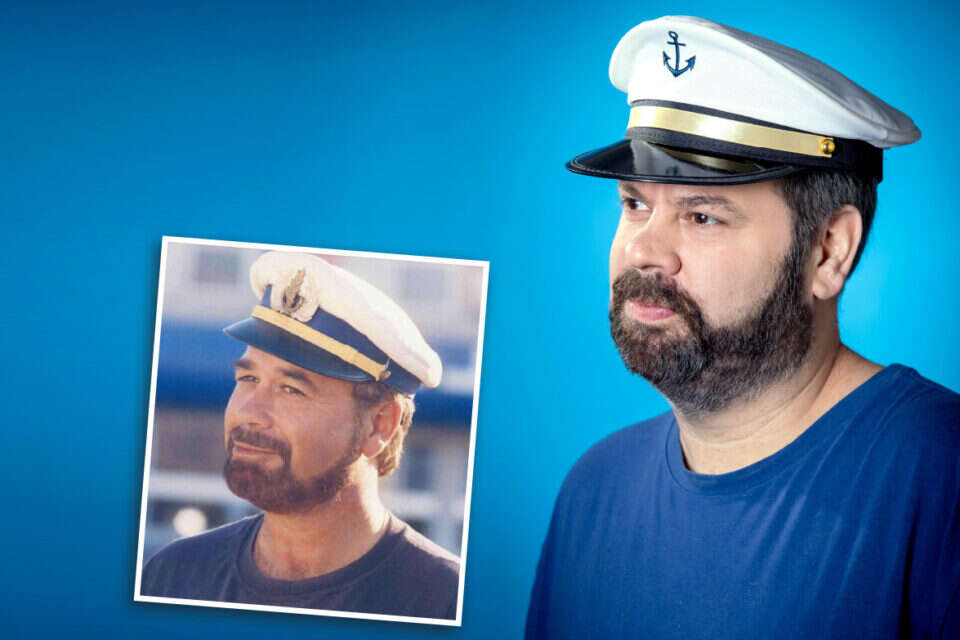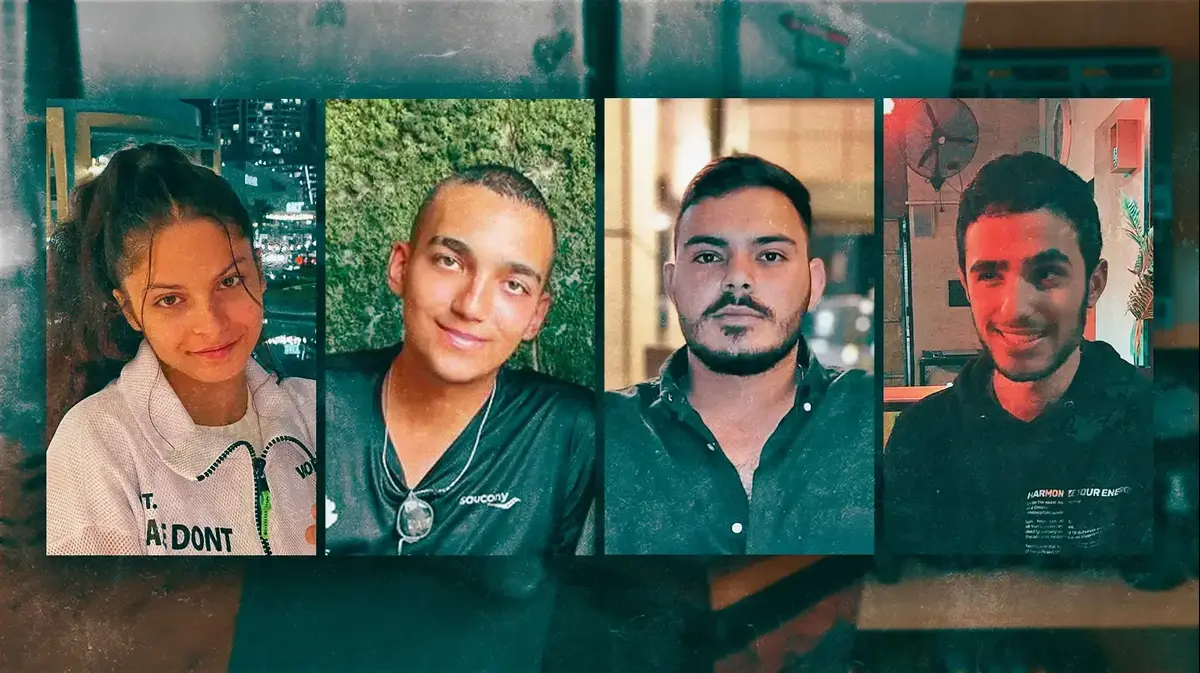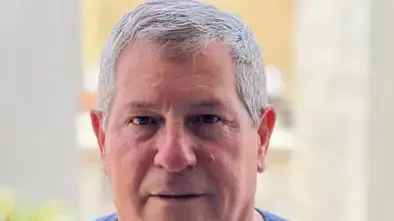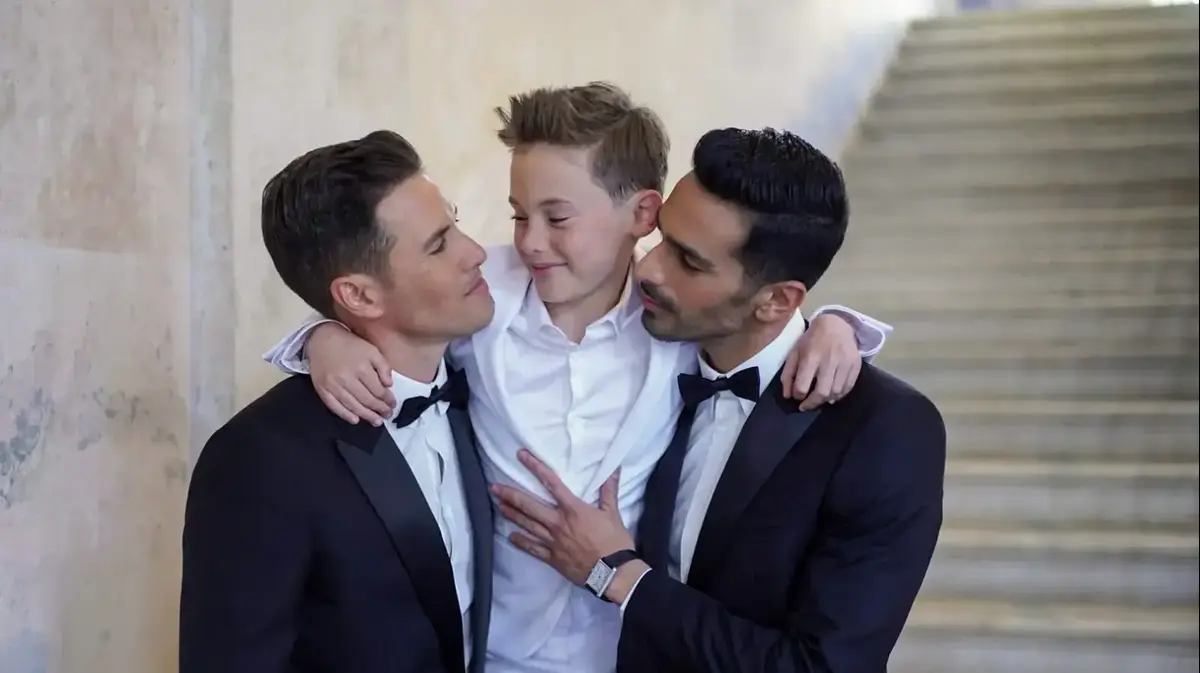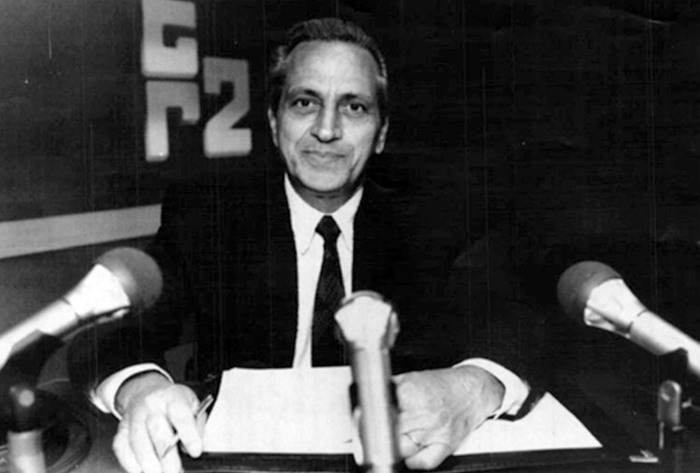Every morning Roy Barkan wakes up and enjoys one second of oblivion.
Immediately after that, he is again struck by the overwhelming longing for his late father, Yehuda Barkan, one of the most beloved actors and creators in the history of Israeli cinema.
The king of thrillers and borax passed away two years ago from Corona, and it seems that Roy is still trying to pick up the pieces.
Along with the consolation of the warm public reactions and the organization of Arab tributes, Barkan Jr. is disappointed and frustrated by the local authorities in Israel, who, according to him, are not acting on their own initiative to commemorate his father on the city streets, in parks and cultural halls.
"There is no doubt that my father was one of the pillars of Israeli cinema, the actor who sold the most tickets for his movies," he says.
"To me, it doesn't make sense that until now there is no organized commemoration for him, and no one cares. Every city has a culture department, why wouldn't they take up the gauntlet? Why should an artist's family go from city to city and submit forms asking them to commemorate him? I decided to take it upon myself to preserve the memory of my father, and thanks to these efforts Yehuda Barkan Park in Kiryat Bialik will be opened in a few weeks, Barmela Square will be announced, and later a cultural hall will be built in his name in Netanya, and probably a street will be named or a large tribute event will be held in his memory in Kfar Saba. They are the only ones out of 122 municipalities in Israel .
Roy Barkan and his father, the late Yehuda,
"My father was like the chief of staff of the film world.
His record is equal to the most senior rank there is.
The prominent chiefs of staff are commemorated on the streets in Israel, but it seems as if my father is less interested in them. In October we will mark exactly two years since his death, and I tried to organize a memorial evening for him. I contacted all the television channels, including cable and satellite, a year ago. I received the answer from all of them that there is no budget.
"All in all, I wanted some stand-up artists, a little"
Actors and an event in a hall with a stage.
My father did the prank show 'Don't screw up an account' for the 'Rainbow' franchise and made quite a bit of money for it, so today they don't have a few shekels for him?
In my eyes, it's terrible and terrible."
What do you think this is due to?
"Unfortunately, my father is not unusual. There is no respect in the country, not for artists and stars of the past, and it is the same for Holocaust survivors. Most of them barely make it through the month. If there is no respect for them, for the people who built and established the country with sweat and tears, then why should there be any different treatment To the people who contributed to the world of culture and sports?"
Were there any authorities that specifically rejected the request to memorialize your father?
"There were no outright rejections, but there were those who texted my requests. For example, one of the spokespersons of the Tel Aviv municipality was very attentive and referred me to someone in the municipality regarding an appreciation evening. I sent her an email, and she replied that the budget I estimated, amounting to tens of thousands of shekels, did not match the budgets The municipals. Such reactions make me sad. Then I spoke to someone else from the commemoration division and asked them to put a metal sign on his production office building, to indicate that that's where he worked. The division employee was nice, promised to check, but never got back to me.
"Tel Aviv is the capital of our culture, and the municipality organizes events and performances costing hundreds of thousands of shekels. People recite complete sentences from 'Charlie and Half' and 'Snooker Celebration,' so my father deserves a proper commemoration. The love of the audience was very important to him, and I want him to He will receive it even after his death."
"I knew the cops were coming"
Yehuda Barkan, who died at the age of 75, is considered an Israeli cinematic mythology.
Over five decades, beginning in the 1970s, he created and starred in classics such as the Burks movies "Charlie and a Half" and "Snooker Celebration";
the comedies "Lupo in New York" and "Looking for a husband on four";
"Stolen Father" film trilogy;
The drama "Kissing in the Middle East", and countless thriller films filmed in Israel and abroad.
Just before the corona changed our lives, he also had time to play in the romantic television comedy "Love in Slykes".
In 2014, Barkan received a lifetime achievement award from the Israel Film Academy.
His personal life was not much different from the Borax films in which he played.
He married in his youth a Brazilian Jewish woman, who left Israel during her pregnancy with their daughter.
He met the daughter, Daniela (53), who currently lives in Brazil and works as an event producer, only once when she was 17, and since then the relationship between them has been loose.
He then married Neely.
The two together raised her daughter, Dana (49), now a parenting instructor, and gave birth to Roy (45) and Ido (43), now the owner of a creative company.
In the mid-1980s, he married for the third time and adopted a daughter.
Roy, single and the father of a 13-year-old daughter, now remembers mainly the good moments that characterized his childhood in Ramat Hasharon.
"Even though my father didn't live with us, he was always there for me. He came to parents' meetings, went on an annual two-day trip to Masada with me, was present at all the graduation parties, showed up with me at the BKOM and came to visit when I closed Shabbat in Tiroon.
I had a famous father, every walk next to him was followed by a crowd of fans asking for autographs.
As a child, I liked the people who were around him and I liked to go with him to the screenings of the films he played in, to be impressed by the ticket sales and the reactions of the audience.
It's hard to say that I had childhood traumas."
Admiration for his father led Roy to be attracted to the world of Zohar, but from a completely different direction.
He liked to produce events, and in high school he organized support rallies for the prisoners and the missing.
When he was only 16 years old, he also started to publicize parties.
The name Barkan opened quite a few doors, but unlike his father, who stayed away from drugs, Roy was drawn to revelry of alcohol and cocaine - a drug he used and later also trafficked.
In the end, he was arrested by the police and called the "celebrity drug dealer" in the media, after Lior and Asi Dayan admitted in their testimony that they bought drugs from him.
"I was 27 years old and I was fascinated. I found out that everyone was using it. Businessmen, artists, lawyers, models, advertisers and who not. It became a routine for me in the shops. Twice a week, and always with friends. Then I found out that they connect with me because I have a gram in my pocket, and I I really like to be loved."
Maybe you were looking for your place through drugs, as someone who grew up next to a famous and beloved father?
"Maybe. I always wanted to be like him, and that was my way of gathering people around me. My father did it with art and creativity, I found it in the world of selling drugs in a club in Tel Aviv. The first time I earned 50 shekels, but I immediately realized that it had economic potential ".
In those days Roy conducted himself with a deceptive sense of celebrity.
Like Gabriel, the charming and carefree crook played by his father in "Snooker Party", he was after easy money.
At least once he had the opportunity to leave the world stained with clouds of white powder.
For example, at the end of 2006, when he was summoned for the first investigation on suspicion of drug trafficking, from which he was soon released.
Even though he realized that the life of a dealer in a dangerous drug could end in handcuffs - he returned to Suru.
At one point, a person close to the field warned him that too many people knew about his actions, and that he might eventually fall into the hands of a police agent.
A prophecy that did come true.
"The agent approached me at the club and introduced himself as someone who knows friends of mine in the US.
He bought one gram of coke from me, but the next time he tried to buy from me I felt that something smelled bad, so I sent him a message that it was over between us."
In March 2007 Roy was arrested for the second time.
"The police knocked on the door of my apartment at ten in the morning, they said they were the building's maintenance company and that there was a problem with the water pipes. I knew intuitively that it was the police, and I wanted to die of shame. I went into shock when they put handcuffs on my hands and feet and took me for questioning, and from there to the Abu Kabir detention center." .
How did your father react to the affair in real time?
"My father had a special quality - he always knew how to greet the bad as he greeted the good. This is something I have also adopted in recent years. He said it was lucky that I was arrested, because if I had been caught a few years later - I might have become a criminal importing suitcases of cocaine from Colombia . He believed it could have been worse."
You work today as a publicist for the entertainment club "Shalvata", isn't that too much of a temptation for you?
"Absolutely not. Today, drugs are not only in clubs. Everyone does it openly, even in the toilets of cafes. My life is different now. If I see someone using a drug near me, it will not attract me. This is why I stopped counting the days when I am clean a long time ago , since I entered rehab at the beginning of 2007. The drugs are an episode of the past."
"There is a synopsis for an entire season"
After a month in the detention center, it was Barken the father who helped to free his son for an alternative to detention, when he managed to find a place for him at the "Returno" rehab center near Jerusalem.
Roy stayed there for six months, and there he conceived his two outstanding projects.
The first - a memoir, which became the book "The Dealer".
The second - an idea for a TV series, "Addicts", which describes what happens between the walls of the rehab center through the stories of those addicted to drugs, gambling, food and sex.
"It wasn't easy for me at 'Returno.' I learned there about my inner anger, about the fact that I was addicted to the good life and that I actually took a lot of shortcuts. The writing of 'The Dealer' calmed me down. I wrote about the years when I traded in Tel Aviv, about the glaciers, about love To my former partner and to the rehab center. After 40 pages I suddenly had a writing block, so I noted in concise points the scenes I saw. At the same time, I had the idea to write the series as well."
Both projects were put on hold after he finished the rehab process, in September 2007. He hoped that the Magistrate's Court in Tel Aviv would take into account the way he did, and admitted to trafficking in a dangerous drug, possession not for personal use and use of a dangerous drug.
At the end of a legal hearing, during which he immediately confessed to the crimes, he was sentenced to 20 months in prison.
The appeals he filed against the amount of the sentence were rejected, and Roy entered Hermon prison in June 2009. Behind bars he met one of the country's most famous prisoners, former finance minister Avraham Hirschzon, who passed away in March of this year.
When he was released after 11 months, minus a third for good behavior, he returned to work as a publicist.
At the same time, he invested in attempts to promote his series.
"Creating a series is a lot of work. I worked on it for more than ten years, and it went through many iterations. At first, Assi Dayan wrote a pilot for it, and we almost closed with the Hot company, but it didn't work out. Then the pilot went to other writers, until it came into the hands of Gadi Taub. The only one who accompanied me from the beginning was the director Yariv Horowitz.
"Today, the series has a synopsis of episodes for an entire season, and we also finished the research on the characters that will appear in it. I believed in its success and ran with it to dozens of meetings with production companies, hoping that someone would invest in the project. At some point I realized that I wanted to do it myself, and Yriv and I were looking for investors, and no we found".
Roy presents about a minute and a half from the pilot for the series, which takes place in a rehab center.
The plot is immersive action on steroids, like "Fauda" about the harsh world of addicts, including expressive lighting and dramatic music.
The cast is no less impressive: Maor Schweitzer in the lead role, alongside Israel Oglebo, Tikva Gideon, Yeftah Klein, Uri Hochman and Sovel Ariel Or.
"Three years ago, I realized that the series could not remain only on paper, so we filmed the pilot. My brother, Ido, was one of the investors. A few months ago, we transferred the pilot and the synopsis of the series to a production company in the USA.
We are in advanced talks with her.
If they decide to take on the project, it will be filmed in Israel and in Hebrew, with the hope that it will be broadcast on Netflix in the future.
That's where we're headed.
Maybe there will also be an American version later.
For me, the series is a life project.
I will not be quiet until it is published."
Did you designate a role in the series for your father?
"He was supposed to be the rabbi of the rehab center."
Although he put his best efforts into the series, it was actually the book that was published first, about a year ago.
"In Shiva on my father, I met Yolanda Hirsch, one of his former employees in the production office, who today also works as a shadow writer. I asked her to help me finish the book. She did exactly what I saw in my vision. The first part refers to sex, drugs, parties and ice creams The second part is the arrest by the police, and the third is my love story with my ex and our shared daughter. The responses I received to the book are amazing, and I sold hundreds of copies on the Internet, even though I have not yet transferred it to the known networks."
Why didn't you pass it on to them?
"Because I initially wanted to test the area and the reactions. Now that I have returned the investment, I can afford to move to the book chains, because I want to reach a much wider audience. It will happen soon."
Did your father read a draft of the book?
"He managed to read a few chapters and really liked it."
Following the book, Roy recently also launched the lecture "Stolen Child", which unfolds with pain and humor the complex stories of his life.
"I tell about my childhood as the son of a famous actor, about the deterioration into drugs and how I got out of it. When school starts, it is important for me to go to schools to explain to the youth how important it is to ask for help. If one child does not approach drugs thanks to my lecture - I have done my part. To the parents I can describe the early signs, and how to recognize if their child is an addict, God forbid. They need to know that it is almost impossible to get out of this on their own, and that it is highly recommended to seek professional help."
"I was still full of hope"
Roy does not forget the way he made to the Tel Hashomer hospital when his father was hospitalized for a few hours due to high blood pressure.
It happened in May 2020, about two months after the corona reached Israel and the level of anxiety in the Emir public reached heights not seen before.
"He had been hospitalized before, but this was the first time I thought my father could die. The thought scared me. I didn't know how I would cope if he wasn't here with me. When I got to him, he was lying on the bed laughing with the other patients without a mask on his face I was angry with him.
"Unfortunately, my father didn't take care of himself. He trusted in God. He constantly walked around synagogues and Torah classes, usually without a mask. I worried about him. If it were up to me, he would have stayed in his house and only went out to the grocery store. Two months before his hospitalization, In March of that year, he had his 75th birthday and I planned a big event in his honor, but that's when the corona virus started, and I had no intention of putting him at risk.
"I asked his friends, the actors, to send me video greetings. From these I made a video in which I combined clips from the films in which he played. They all wished him health and longevity, and told him that 75 is too young for him. Gedi Yigil even told him humorously, 'Be careful of the corona, so that Don't kill us all'. I didn't imagine then that this is what would happen six months later. In retrospect, I made a farewell video for my father."
How did you get the message that it was verified for the virus?
"He didn't feel well and called me when he was on his way to a corona test. The next day he told me the answer in his humorous way: 'I told you that being positive is not always a good thing.' in Jerusalem. It was on Yom Kippur, before the start of the fast, and he sounded fine to me. When I called on Moatsi Kippur, he said he didn't feel well at the hotel and therefore went to the Corona ICU at Hadassah Hospital. I was very stressed.
"Two days later, Dana, my sister, came to visit him and was under the impression that he was in good health, because he was in a good mood. Hadassah told me otherwise on the phone. He was not connected to the devices, but they defined him as critical due to a low level of saturation (oxygen saturation in the blood). The next day I also arrived. Before I entered Hadassah, his wife sent a message on the family WhatsApp and announced that my father was being sedated and ventilated. I was shocked.
"When I entered the corona ward, I noticed that there was a patient by the door. I looked at him for a moment and continued in the direction of another patient. The nurse asked me if I was Yehuda Barkan's son and pointed to the patient by the door. I told her she was getting confused, because I saw that it wasn't him. It turned out that I didn't recognize My father. The tube he had in his mouth distorted his face, and they also put plasters over his eyes, so that they would remain closed. I stood next to him and it took me a few minutes to come to my senses. I spoke to him, played him blessings that rabbis sent me and asked him to be strong. It was a difficult experience, but I was sure he would get out of it."
A few days after the visit, the doctors informed the family that Barken's condition was improving, and Roy came to visit him again - but then he deteriorated.
"I was still full of hope, especially after his condition improved again. When we were told that he was deteriorating once more, I became pessimistic. I internalized that there was a chance that he wouldn't come out of it. On Friday, October 23, the doctors called us to say goodbye to him. Dad looked like he was sleeping peacefully."
What did you say to him in his last hours?
"There are relatives of a deceased person who regret not telling him that they loved him, but I told my father that all the time. We spoke twice every day and I told him everything. Even when we said goodbye in the hospital, I told him that I loved him, that I would miss him and that I would make sure to immortalize him. When I left his home I was still hoping for a miracle. It didn't happen. In the evening he died. I cried. I felt his death was stupid and unnecessary."
"It was kind of an open secret"
From the day she was born, Daniela Schwartz-Schiffer was nicknamed "Yehuda Barkan's secret daughter".
Her mother, Helena, flew to Israel from Brazil during the Six Day War to volunteer at Hadassah Hospital, where she met Barken, who appeared to the wounded.
It was love at first sight, and the two married when they were 23. When their relationship broke down, Helena was already pregnant.
She returned alone to Brazil and remarried there when Daniela was a year and a half old.
Daniela first saw her father in the late 1980s, when she was 17. He came for a three-day visit to Brazil, and that was the first and last time they met.
Since then they maintained a loose correspondence, which ended a few months later.
After three decades, in 2018, she made contact with Roy and Ido through Facebook.
Since then, the brothers corresponded with her periodically, and Roy even invited Daniela to Barken's 75th birthday party.
As mentioned, the celebration and the surprise did not materialize.
"I can't pinpoint the exact day when my father told me we had another sister, but it was always in the background," Roy says quietly.
"In the beginning this topic was kind of an open secret, but dad told about it on Manny Parr's TV show in the late 80s."
Do you know why the relationship between your father and Daniela was not preserved?
"My father claimed that her adoptive father was not enthusiastic about it."
Did you ask about her as a child?
"No. I grew up knowing that I had a sister in Brazil, but it didn't interest me. When my father flew to visit her, he asked the brothers to write her a few words. I would never remember what I wrote, until she sent me a photocopy of the letter."
In a round script, on grid paper, Roy wrote with sincere childhood: "To Daniela, my sister, hello. I miss you very much and want to see you in Israel. What does it sound like and how is it in Brazil? It's a beautiful country. I have nothing more to say. Goodbye, Roy."
"I admit that if she hadn't contacted me four years ago, I probably wouldn't have done it on my own initiative. After my father passed away, it was important for us to meet her face to face for the first time. She came with her husband, in May, and we had dinner together at Dana's. I hugged her Her and I was very excited.
"The family was important to my father, and Daniela is a part of us. I'm sure that that evening he looked down on us and was happy. Since then Daniela and I have kept in regular contact, and I plan to fly to her in Brazil soon. It's important for me to get to know her family and see where she grew up." .
When you sat together, did you look for similarities to your father in her?
"In the beginning, when we talked on WhatsApp, I looked for the resemblance to him and us, but when she arrived in Israel I was focused on excitement. Suddenly I have another older sister, and even older than the one I thought was the eldest. My brothers think she resembles family, but I didn't see it."
Are your feelings for her the same as your feelings for the rest of your brothers?
"Not exactly. Still, we never saw each other until a few months ago. The feeling is different. Naturally, I can't have the same relationship as I have, for example, with Dana, with whom I grew up for 45 years."
As a parent yourself, can you understand your father's detachment from her?
"It's a situation that's hard for me to talk about, because I've never experienced it. Someone else adopted Daniela, and my father respected that place."
Daniela said in the past that after your father's visit to Brazil, he left her a copy of "Stolen Father" and told her that the script was inspired by her.
This is true?
"It's not 'Stolen Father', but the film 'Kissing in the Army' from 1990, in which the main character, played by Michal Yanai, has a father she doesn't know.
The common features between the plot and my father's life are a pregnant woman, a girl born in another country and the father who only meets her when she is an adult.
My father did not hide that she was the inspiration for the script."
How do you manage your complex family?
With the exception of Ido, with Dana you only have a common mother, with Daniela the father is the common one, and in addition you have an adopted sister that your father raised from his third marriage.
"Here's an idea for a telenovela," he laughs.
"Dana is my sister to all intents and purposes. I grew up in a family of three brothers, and my father treated Dana as his biological daughter. My sister from my father's third marriage is also part of the family. Blood relation is less important than the fact that my father chose her as his daughter. I always knew about Daniela, too If I hadn't met her until a few months ago."
"Want a museum"
About a month ago, Roi Arab organized a tribute in memory of his father, in the Zim compound in the Beit Shan Valley, under the title "Stolen father of all of us - remember Yehuda Barkan".
A photo exhibition was opened at the venue with photos of Barkan from the films in which he played, and panels were held with the participation of his friends, including Aryeh Moscona, Moti Giladi, Moshik Timur and Moshon Albohar.
Finally, two of his films and selected clips from his thrillers were screened.
"I organized a similar event a year ago in Netanya. My ambition is that such an evening, which is open to the general public, will run throughout the country. Maybe I will organize a similar event in memory of my father in a month, because there I will reveal the song written and composed by Hadas Shur. The song was created with the help of a video clip from 15 years ago, In which my father tells the story of his life.
"In the end, everything is my initiative and that of my brothers. I have countless ideas for projects. For example, we are looking into the possibility of putting on a musical play based on my father's life. In addition, we came up with an idea for pop puppets on a key chain, which Ben Shricki created for us. The puppets They are father figures from 'Charlie and a Half' and 'Stolen Father'. Later on they will have a small button, and pressing it will play a famous sentence from the movie in father's voice. It will be a hysterical hit. Another thing I am working on now, and scheduled for the end of the year, is An event to mark the 35th anniversary of the first 'Stolen Father'. The idea is to have an evening with all the actors who played in the film."
What is the role of the Ministry of Culture and Sports in the commemoration of your father?
"I spoke with the Minister of Culture Hili Trooper and found an attentive and caring person. We talked about the possibility of establishing a museum of the history of cinema in Israel, which would be named after my father, and he gave me advice on the matter. It is a raw idea, and we are rolling it out with the owner of Cinema City, Moshe Edri, who was A good friend of father's, and he also made a docu-film about him that will be shown next month at the Haifa festival. If the museum comes to fruition, I hope that whoever will be the future minister allocates a budget for it."
As someone who was addicted to the love of the crowd, what would he say if he saw how hard you try and don't always succeed?
"He would only look at what I was successful at - and he would be proud. There is a construction boom in the country today, and quite a few new neighborhoods are being built. Is it really that complicated to name one street after Yehuda Barkan?"
The Tel Aviv Municipality responded: "Tel Aviv-Jaffa Municipality works to commemorate female artists, artists and women and intellectuals who left their mark on the city in a variety of ways, whether by placing commemorative signs on the fronts of houses, reading the names of streets or institutions and more.
"Roi applied to commemorate his father, the late Yehuda Barkan, about a year ago, and it was explained to him how he should submit an orderly application, which will be examined when accepted.
Regarding an appreciation event, the municipality does not hold appreciation evenings, but we recommend that he contact the various cultural institutions and associations in the city that usually hold such evenings."
were we wrong
We will fix it!
If you found an error in the article, we would appreciate it if you shared it with us

